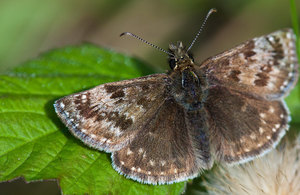Five landmark nature recovery projects launched to protect wildlife and improve public access to nature
Over 99,000 hectares of England to be dedicated to supporting wildlife and nature for people to enjoy

The Dingy Skipper butterfly is one of the species which may benefit from the Purple Horizons nature recovery project.
Five unique nature recovery projects spanning nearly 100,000 hectares will transform the public’s enjoyment of nature in the West Midlands, Cambridgeshire, the Peak District, Norfolk and Somerset, the government and Natural England announced today (Thursday 26 May).
These multi-partnership projects will see newly created and restored wildlife-rich habitats, corridors and stepping-stones which will help wildlife populations to move and thrive across town and countryside.
They will improve the landscape’s resilience to climate change, providing natural solutions to reduce carbon and manage flood risk. Equivalent in size to all 219 current National Nature Reserves they will also allow more people to enjoy and connect with nature on their doorstep.
The Purple Horizons project in Walsall in the West Midlands alone will enable over 500,000 people to reconnect with nature close to where they live, in one of England’s most socially deprived areas.
All five projects will also make a significant contribution towards the national delivery of the international commitment to protect at least 30% of land and sea by 2030, and will help to achieve the Environment Act’s legally binding target to halt the decline in species abundance by 2030.
Environment Minister Rebecca Pow said:
These five projects across England are superb examples of exciting, large-scale restoration that is critically needed to bring about a step change in the recovery of nature in this country.
They will significantly contribute to achieving our target to halt the decline in species abundance by 2030 and our commitment to protect 30% of our land by 2030, enabling us to leave the environment in a better state than we found it.
Natural England Chair Tony Juniper said:
Nature recovery can only occur if we take action at scale, and that can only work through partnerships. These five landmark projects will seek to recover species and habitats through collaboration among a wide range of land owners and organisations, delivering benefits for wildlife, local economies, adaptation to climate change and for public wellbeing.
Looking after and recovering the health of the natural world upon which we all depend is at the heart of Natural England’s work, including through the development of the Nature Recovery Network that is such an important part of the Government’s environmental ambition. I am delighted we are taking this step today, driving practical action on what is one of the most urgent challenges of modern times.
Joan Edwards, director of policy at The Wildlife Trusts, says:
It’s good to see positive ambition from Government to help people access nature close to where they live, as well as efforts to connect existing strongholds for wildlife. Species desperately need green corridors to bridge together fragmented habitats in addition to big, bold projects that enable landscapes to recover at scale.
Wildlife has suffered catastrophic declines in recent decades and 15% of species in the UK are at risk of extinction. Government can help turn that around by accelerating the creation of a nature recovery network, dedicating more land for nature, and applying stronger protections for our most important sites.
The nature recovery project areas are:
-
Purple Horizons, West Midlands- extending across 10,000 hectares on the fringes of the West Midlands conurbation, Purple Horizons is restoring and connecting fragmented nationally and internationally important heathlands to create a mosaic of heathland-wetland-woodland-grassland, vital for the recovery and long-term resilience of the area’s reptiles, birds and pollinators.
-
Cambridge Nature Network, Cambridgeshire - covering 9,200 in and around the City of Cambridge, linking the inner city to rural countryside across a range of priority habitats and landscapes including chalk grassland, fenlands and ancient woodlands.
-
Wye Valley, Peak District – covering 10,000 hectares, the project is conducting pioneering investigations on how an investment model can be created to generate funding for habitat restoration and creation, providing multiple nature recovery benefits.
-
Somerset Wetlands, Somerset – with the new 6,140-hectare super National Nature Reserve at its heart, Somerset Wetlands is working with local partners and landowners across 60,000 hectares to enhance nature recovery through habitat creation and investing in strategic solutions that make the wetlands more sustainable and the landscape more resilient to climate change.
-
Wendling Beck, Norfolk - the Wendling Partnership has come together to embark on an ambitious and inspiring nature restoration project linking initiatives around the Upper River Wensum and 10,000 hectares in the surrounding farmed countryside of mid-Norfolk.
An initial £2.4m in funding is being provided by Defra and Natural England, part of funding for the flagship Nature Recovery Network (NRN) which aims to increase, improve and connect existing wildlife-rich sites and restore and connect degraded land, turning it into healthy functioning ecosystems, rich in wildlife and resilient to climate change, which provide us with clean air, water and healthy soil.
The Nature Recovery Projects being announced today will also include improved footpaths, bridleways and green infrastructure which will connect nature to where people live, work and play – benefiting physical health and mental wellbeing, and providing habitat creation that supports the roll out of biodiversity net gain, demonstrating how public and private finance can support nature recovery.
The announcement today follows last week’s declaration of the new Somerset Wetlands ‘super’ National Nature Reserve (NNR by Natural England which will protect 6,140 hectares of precious saltmarsh, heath and wetland habitats that are home to nationally significant wildlife populations.